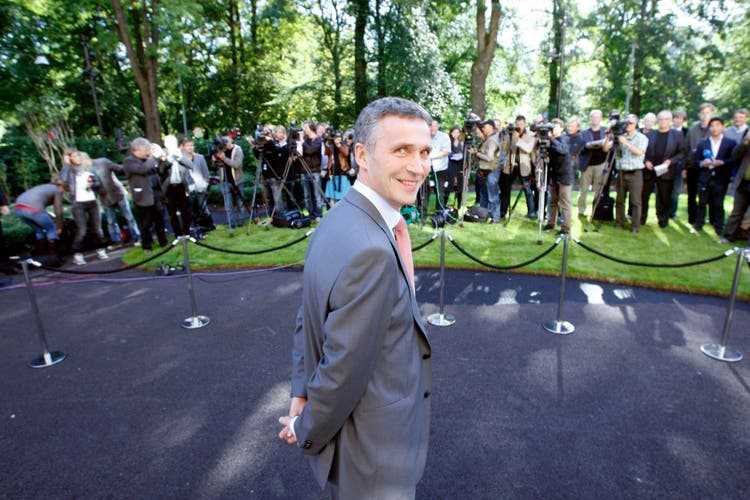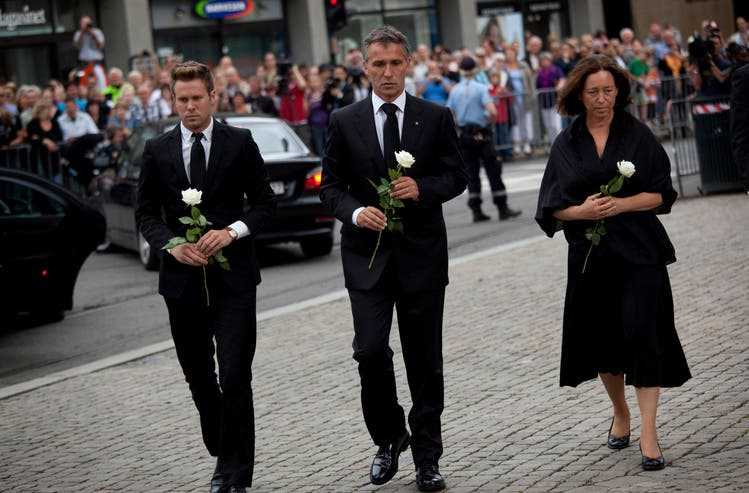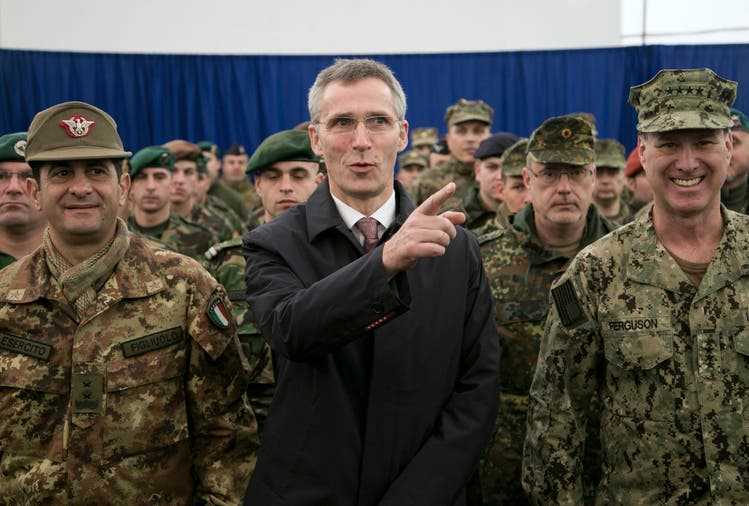The NATO Secretary General grew up with freedom fighters and spies at his kitchen table. He changed from an anti-American youth to a pragmatic power politician. Today he is indispensable at the head of the western alliance.
As NATO Secretary General, Stoltenberg attended a summer camp for young people in Norway in 2015.
It was in the second half of the 1980s that an employee of the Soviet secret service KGB and the son of an influential Norwegian political family regularly ate shrimp sandwiches in one of Oslo’s oldest restaurants. Boris Kirillov worked as a cultural attaché at the Soviet Embassy. Jens Stoltenberg studied economics and led the youth organization of the workers’ party.
We liked each other and appreciated the exchange. The talks went so well that at some point Moscow prepared a dossier on the promising young politician and came up with a code name for him. Stoltenberg aka “Steklov” was one of those people who were in an “advanced stage of cultivation” or were already considered “confidential contacts” of the KGB.
Left parental home
He didn’t know any state secrets at the time and therefore wasn’t afraid to talk too much, Stoltenberg said later. Luckily for him, in early 1990 a Soviet defector drew the authorities’ attention to Kirillov and his mysterious informant “Steklov”. Shortly thereafter, the Norwegian secret service turned the tables: Stoltenberg was instructed to meet the friend again and convince him to switch sides. The attempt failed, however, and the young social democrat never saw Kirillov again.
The episode should not harm Stoltenberg politically. The later Norwegian Prime Minister and current Secretary General of the North Atlantic Pact the failed recruitment attempt of the Russians a few years ago in his biography publicly. At the time, he deliberately sought contact with representatives of the Eastern Bloc countries in order to understand them better, the 63-year-old wrote. His father Thorvald even recommended that he talk to KGB people because they were “among the smartest”. Of course you just have to be careful what you say.
Thorvald Stoltenberg, a former Norwegian Ambassador, Foreign Minister and like his son, a well-known member of the Labor Party, was known for inviting freedom fighters like Nelson Mandela, diplomats and colorful personalities to his home. So it’s quite possible, Jens’ older sister Camilla once revealed to the BBC, that one or the other spy was also sitting at the kitchen table.
In view of the left-wing academic milieu in which Jens Stoltenberg, who was born in 1959, grew up – his mother Karin was a state secretary and a well-known feminist, his aunt Marianne Heiberg was a peace-loving Middle East expert – there was actually nothing to suggest that he would one day become the head of the largest military alliance in the world.
On the contrary: as a student, he got involved Graduated from a Rudolf Steiner school early in the socialist youth movement. He grew his hair, listened to Bob Dylan and threw stones at the windows of the American embassy to protest the Vietnam War. Only after completing his studies and starting his career in the statistics office did Stoltenberg gradually transform into a serious party soldier. In 1995, as Industry Minister, he took part in a bicycle rally to demonstrate against French nuclear weapons tests.
gloomy years
In 2000, at the age of 41, Norwegians elected him the youngest prime minister in their history. However, the slim man with the rimless glasses only became known to a broader international public after the terrorist attacks of July 22, 2011. At the hands of a right-wing extremist, 77 mostly young people died in Oslo and on the island of Utöya.

Prime Minister Stoltenberg speaks to the press after his election victory in 2009.
The nation was shocked and sought comforting words. Stoltenberg, who has two children himself, found them. One must, he said again and again, counter terror with openness and democracy, not with hatred. That impressed the Norwegians. However, they voted him out in the elections two years later. A surprising phone call followed from German Chancellor Angela Merkel, who proposed him the post of NATO Secretary General.

Stoltenberg (centre) with his wife Ingrid Schulerud before the funeral service at Oslo Cathedral after the massacre of youths during a summer camp in 2011.
He, who had once demonstrated loudly against the Western alliance, but then persuaded the left in the party to overturn an exit decision, and finally decisively supported NATO operations in Afghanistan and Libya, should now become their top representative. Not a comfortable job, because in 2014, when Stoltenberg took office, Vladimir Putin had already conquered the Ukrainian peninsula of Crimea and instigated a war in Donbass.
But that’s not all: In Afghanistan, the Taliban became stronger again, in the Middle East the Islamic State challenged the world. In the United States, Donald Trump, a declared NATO critic, won the presidential election. By persuading the Republican that the allies would increase military spending to the target of 2 percent of their GDP, Stoltenberg managed to persuade the Republican, the Norwegian saved the alliance from collapse. Trump had already threatened to leave NATO.

Secretary General Stoltenberg with NATO peacekeeping forces in Kosovo’s capital Pristina 2015.
Stoltenberg managed to keep the 30 member states on course despite strong differences, national egoism and “brain death” diagnoses. It’s no wonder that the mandate of the skillful moderator has been extended again and again – most recently in March. Since the Russian invasion of Ukraine in February 2022, the Allies have insisted that the always friendly and disciplined Mr. Stoltenberg should remain at the helm of the organization not until the end of September 2022 as planned, but at least until September 2023. In the biggest security crisis in Europe since the Second World War, NATO did not want to do without a cool head like him.
ghosts of the past
Stoltenberg has vowed the allies not to get drawn into a war with Russia as long as NATO territory is not attacked. At the same time, the alliance decided to massively strengthen its forces on the eastern flank. Arming and deterring is the motto, which is not without reason reminiscent of the Cold War. In order to prevent the whole world from being on fire, a direct exchange of blows with the Kremlin must be avoided. However, exercising restraint and thus encouraging Putin to carry out further invasions would also be dangerous.
One might assume that the crisis also has a personal touch for the Secretary-General. Because in Alexander Grushko, the Russian Deputy Foreign Minister, who traveled to Brussels with a delegation from Moscow on January 12 to fool the West into believing that it was ready for peace, Stoltenberg could see more than just a diplomat.
After all, it was Grushko’s father, the legendary KGB general Wiktor Grushko, who once chose Stoltenberg as a recruiting target. According to Norwegian journalist Alf Reidar Jacobsen, Grushko Sr “most dangerous spy the Russians had in Norway after the war”. Did his son Alexander read the “Steklov” dossier and his father’s notes carefully before he flew to Belgium for the sham negotiations? It would be conceivable.
The Brussels correspondent Daniel Steinvorth Twitter follow.
